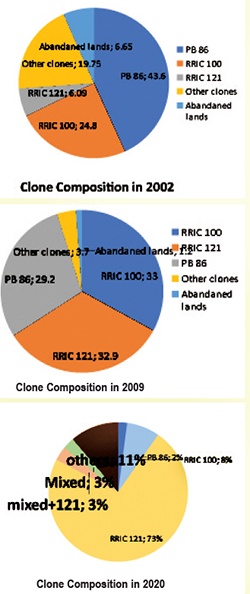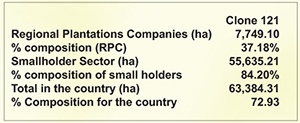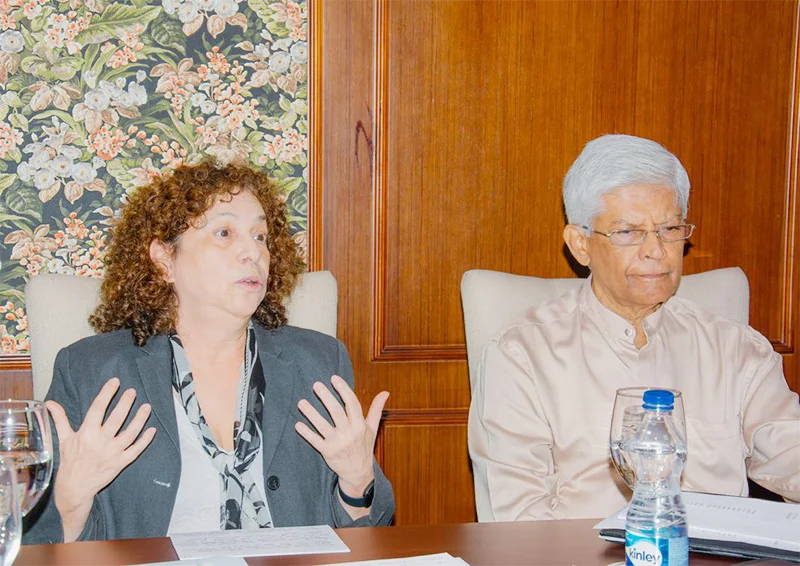Features
A divine intervention needed to save rubber industry

J. A. A. S. Ranasinghe
Productivity Specialist/Management Consultant
Former Director of Rubber Research Institute (RRI), Dr. L. M. K. Tillekeratne’s article in The Island of 26 October, has dealt with several core issues that have contributed to the near collapse of the rubber industry in the country. The importance of clone balancing appears to have escaped the attention of the stakeholders. His piece has not only aroused much public interest but also served as an indictment of the Rubber Development Department (RDD) and the Ministry of Plantation Industries (MPI).
Rationale for clone balancing
Clone balancing means that a country at any given time should have a basket of different clones more than five for the survival of the rubber plantations.
The RRI has asked all stakeholders (Regional Plantation Companies (RPCs), large plantations and smallholders) to abide by the recommended composition of different varieties of clones without depending on one or two clones countrywide as an insurance against possible losses on account of plant diseases. History shows the enormous losses countries have suffered due to their dependence on a few clones. In 1977, clone RRIC 100 was withdrawn as it accounted for more than 40% of the rubber cultivation. Similarly, clone PB 86 was withdrawn twice in 1983 and 1989. With this aim in mind, the RRI periodically prescrib

es the healthy and proper balance of clones to be maintained for the survival of the rubber plantations.
The former RRI Director has stressed the advisability of having a series of recommended clones so that rubber plantations could be commercially run on a profitable basis.
An analysis of the above three scenarios would show a startling deterioration trend. Had a pathogen attacked the rubber plantations in 2002 approximately 68.4% (PB 86 – 43.6%) and RRIC 100 (24.8%) of the Sri Lankan rubber plantations would have been wiped out, leaving a meagre hectarage of 42.6% of the plantations. This disastrous situation had been more or less the same if a pathogen attacked RRIC 100 and RRIC 121 clones, thus destroying 65.9% of the entire rubber plantations. However, the current scenario in 2020 is much graver in that 73% of the rubber plantations with the same clone (RRIC 121) will face a calamitous situation. In the case of RRIC 121, smallholders will be the worst affect as they have cultivated 55,635 hectares with RRIC 121 and as a percentage it would be around 54.20% as per the following table.
The inevitable result of this situation would be that approximately 450,000 employees would lose their employment, and such an eventuality will lead to social unrest amidst a pandemic. It behoves the main stakeholders namely Ministry of Plantation Industries
, Rubber Development Department, Regional Plantations Companies, Rubber Research Board, Rubber smallholders to be fully awake to this situation and comply with the guidelines on clone balancing criteria as well as other best agricultural practices stipulated by the RRI.
All nurseries managed by the Regional Plantation Companies (RPCs), Rubber Development Department (RDD) and Private sector Nursery Owners are periodically inspected by the RRI to ensure that they meet the quality standards and also to ensure that such nurseries abide by the clone balancing stipulated by the RRI.
The fact remains that RPCs, RDD and private sector nursery owners have not strictly adhered to the basket of specific clones advocated by the RRI. Both RDD and private nurseries are primarily responsible for the issue of plants to the smallholders and they are duty bound to issue plants in keeping with the RRI specifications. It is abundantly clear that this requirement has not been complied with. How come the rubber smallholders have cultivated an excessive hectarage of 55,635 with a single clone of RRIC 121, covering an extent of almost 84.20% of the cultivation as seen above. If a leaf disease attacks this clone, total extent of rubber of 46,355 ha will have to be destroyed. It is unfortunate that our stakeholders have not realised this situation.
As Dr. C. S. Weeraratna, former Director of the Advisory Services of the Rubber Research Board has pointed out the country will have to forego an annual foreign exchange loss of Rs. 4.920 million. Can the country afford a loss of this magnitude at this juncture?
The blame for this sorry state of affairs should be placed at the doorstep of the RDD, which is responsible for the issue of plants to the smallholder sector. The Director General (DG) of the RDD is an Ex-Officio of the Rubber Research Board and he interacts with the RRI on clone balancing amongst any other matters and why he had ignored an important requirement involving the life and death of the rubber plantation is a moot point.
Although the RRI is responsible for supervising the nurseries managed by the RDD, it has limited access to the private rubber nurseries managed by the RDD. The private rubber nursery owners have a system of sub-con
tracting nurseries with hardly supervision. If one visits Ruwanwella, Dehiowta, Yatiyantota in the Kegalle District, one can see more than 1,000 individual nurseries sub-contracted by the RDD. It is a mere business for them. They are completely unaware of the clone balancing aspects to be maintained. The clone balancing has already gone out of control of the RRI.
The writer is of the view that the responsibility for managing all nurseries should be taken over by the RRI. The scientists of the RRI are quite capable of handling this task more scientifically. It is relevant to place on record that RRI was given the task of managing the nurseries that were managed by RDD in 2002, when the government decided to close down the RDD. With the change of the government in 2004, this decision was reversed and the task of managing the nurseries was entrusted to RDD at the behest of the bureaucracy, disregarding all the scientific advice. We are

where we are today, as a result.
Both Ministry of Plantation and Rubber Development Department have been in a deep slumber for many years without taking proactive measures to overcome this situation. Many articles that have appeared in The Island during the recent years should have galvanised the authorities concerned into action. All smallholders of the rubber growing districts sent more than 60 representatives to Parliament at the last general election, believing in assurances given in election manifestos, but these MPs done precious little to protect the rubber industry. Rubber smallholders are of the view that at this rate it will be impossible to save the industry without a divine intervention.
Publication of Bulletin on Rubber
The non-publication of the RRI bulletin containing the research findings since 2018 has been a serious lapse on the part of the RRI. My inquiries have revealed that the majority of the scientists have left the institute to join our national universities due to better prospects.
2. From this year onwards RRISL will pay more attention on clone balance while nursery inspection for plant quality improvement.
Features
SL urged to use GSP+ to the fullest to promote export development

 Sri Lanka needs to take full stock of its current economic situation and use to the maximum the potential in its GSP+ facility for export sector growth. In the process, it should ensure that it cooperates fully with the European Union. The urgency of undertaking these responsibilities is underscored by the issues growing out of the recent US decision to sweepingly hike tariffs on its imports, though differentially.
Sri Lanka needs to take full stock of its current economic situation and use to the maximum the potential in its GSP+ facility for export sector growth. In the process, it should ensure that it cooperates fully with the European Union. The urgency of undertaking these responsibilities is underscored by the issues growing out of the recent US decision to sweepingly hike tariffs on its imports, though differentially.
These were principal ‘takes’ for participants in the Pathfinder Foundation’s Ambassadors’ Roundtable forum held on April 8th at the Colombo Club of the Taj Samudra. The main presenter at the event was Ms. Carmen Moreno Raymundo, Ambassador of the European Union to Sri Lanka and the Maldives. The forum was chaired by Ambassador Bernard Goonetilleke, Chairman, Pathfinder Foundation. The event brought together a cross-section of the local public, including the media.
Ms. Moreno drew attention to the fact Sri Lanka is at present severely under utilizing its GSP+ facility, which is the main means for Sri Lanka to enter the very vast EU market of 450 million people. In fact the EU has been Sri Lanka’s biggest trading partner. In 2023, for instance, total trade between the partners stood at Euros 3.84 billion. There is no greater market but the EU region for Sri Lanka.
‘However, only Sri Lanka’s apparel sector has seen considerable growth over the years. It is the only export sector in Sri Lanka which could be said to be fully developed. However, wider ranging export growth is possible provided Sri Lanka exploits to the fullest the opportunities presented by GSP+.’
Moreno added, among other things: ‘Sri Lanka is one among only eight countries that have been granted the EU’s GSP+ facility. The wide-ranging export possibilities opened by the facility are waiting to be utilized. In the process, the country needs to participate in world trade in a dynamic way. It cannot opt for a closed economy. As long as economic vibrancy remains unachieved, Sri Lanka cannot enter into world trading arrangements from a strong position. Among other things, Sri Lanka must access the tools that will enable it to spot and make full use of export opportunities.
‘Sri Lanka must facilitate the private sector in a major way and make it possible for foreign investors to enter the local economy with no hassle and compete for local business opportunities unfettered. At present, Lanka lacks the relevant legal framework to make all this happen satisfactorily.
‘Sri Lanka cannot opt for what could be seen as opaque arrangements with bilateral economic partners. Transparency must be made to prevail in its dealings with investors and other relevant quarters. It’s the public good that must be ensured. The EU would like to see the local economy further opening up for foreign investment.
‘However, it is important that Sri Lanka cooperates with the EU in the latter’s efforts to bring about beneficial outcomes for Sri Lankans. Cooperation could be ensured by Sri Lanka fully abiding by the EU conditions that are attendant on the granting of GSP+. There are, for example, a number of commitments and international conventions that Sri Lanka signed up to and had promised to implement on its receipt of GSP+ which have hitherto not been complied with. Some of these relate to human rights and labour regulations.
‘Successive governments have pledged to implement these conventions but thus far nothing has happened by way of compliance. GSP+ must be seen as an opportunity and not a threat and by complying with EU conditions the best fruits could be reaped from GSP+. It is relevant to remember that GSP+ was granted to Sri Lanka in 2005. It was suspended five years later and restored in 2017.
‘The importance of compliance with EU conditions is greatly enhanced at present in view of the fact that Sri Lanka is currently being monitored by the EU with regard to compliance ahead of extending GSP+ next year. A report on Sri Lanka is due next year wherein the country’s performance with regard to cooperating with the EU would be assessed. The continuation of the facility depends on the degree of cooperation.
‘A few statistics would bear out the importance of Sri Lanka’s partnership with the EU. For example, under the facility Sri Lanka benefits from duty free access in over 66% of EU tariff lines. The highest number of tourist arrivals in Sri Lanka in 2023 was from the EU’s 27 member states. Likewise, the EU’s 27 member states rank second in the origin of inflows of foreign exchange to Sri Lanka; with Italy, France and Germany figuring as the main countries of origin. Eighty five percent of Sri Lanka’s exports to the EU market benefits from GSP+. Thus, the stakes for the country are high.’
Meanwhile, President, In-house Counsel & Legal Advisor, The European Chamber of Commerce of Sri Lanka, John Wilson said: ‘GSP+ should be seen as not only an opportunity but also as a necessity by Sri Lanka in the current international economic climate. ‘Implementation of local laws is what is needed. Considering the pressures growing out of the US imposed new tariff regime, a good dialogue with the EU is needed.
‘Sri Lanka’s level of business readiness must be upped. Among the imperatives are: An electronic procurement process, Customs reforms, a ‘National Single Window’, stepped-up access to land by investors, for example, a clear policy framework on PPPs and reform of the work permits system.’
It ought to be plain to see from the foregoing that Sri Lanka cannot afford to lose the GSP+ facility if it is stepped-up economic growth that is aimed at. It would be in Sri Lanka’s best interests to remain linked with the EU, considering the aggravated material hardships that could come in the wake of the imposition of the US’ new tariff regime. Sri Lanka would need to remain in a dialogue process with the EU, voice its reservations on matters growing out of GSP+, if any, iron out differences and ensure that its national interest is secured.
Features
SENSITIVE AND PASSIONATE…

Chit-Chat
Chiara Tissera
Mrs. Queen of the World Sri Lanka 2024, Chiara Tissera, leaves for the finals, in the USA, next month
I had a very interesting chat with her and this is how it all went:
1. How would you describe yourself?
I am a sensitive and passionate individual who deeply cares about the things that matter most to me. I approach life with a heart full of enthusiasm and a desire to make meaningful connections.
2. If you could change one thing about yourself, what would it be?
Actually, I wouldn’t change a thing about myself because the person I am today, both inside and out, is the result of everything I’ve experienced. Every part of me has shaped who I am, so I embrace both my strengths and imperfections as they make me uniquely me.
3. If you could change one thing about your family, what would it be?
If there’s one thing I could change about my family, it would be having my father back with us. Losing him six years ago left a void that can never be filled, but his memory continues to guide and inspire us every day.
4. School?
I went to St. Jude’s College, Kurana, and I’m really proud to say that the lessons I gained during my time there have shaped who I am today. My school and teachers instilled in me values of hard work, perseverance and the importance of community, and I carry those lessons with me every day. I was a senior prefect and was selected the Deputy Head Prefect of our college during my tenure.
5. Happiest moment?
The happiest moment of my life so far has been winning the Mrs. Sri Lanka 2024 for Queen of the World. It was a dream come true and a truly unforgettable experience, one that fills me with pride and gratitude every time I reflect on it.
6. What is your idea of perfect happiness?
Happiness is a deeply personal and multifaceted feeling that often comes from a sense of contentment, fulfillment and well-being. For me, perfect happiness is in moments of joy, peace and accomplishments … and also being surrounded by my loved ones.
7. Are you religious?
Yes, I’m a very religious person. And I’m a firm believer in God. My faith guides me through life, providing strength, dedication and a sense of peace in every situation. I live by the quote, ‘Do your best, and God will do the rest.’
8. Are you superstitious?
I’m not superstitious. I believe in making my own decisions and relying on logic and faith rather than following superstitions.
9. Your ideal guy?
My ideal guy is my husband. He is compassionate, understanding and is always there to support me, no matter what. He’s my rock and my best friend – truly everything I could ever want in a partner.
10. Which living person do you most admire?
The living person I admire the most is definitely my mummy. Her strength, love and unwavering support has shaped me into who I am today. She is my role model and she inspires me every day with her wisdom and kindness.
11. Your most treasured possession?
My most treasured possession is my family. They are the heart of my life, providing me with love, support and strength. Their presence is my greatest blessing.
12. If you were marooned on a desert island, who would you like as your companion?
I would like to have my spouse as my companion. Together, we could make the best of the situation, supporting each other, sharing moments of laughter and finding creative ways to survive and thrive.
13. Your most embarrassing moment?
There’s quite a few, for sure, but nothing is really coming to mind right now.
14. Done anything daring?
Yes, stepping out of my comfort zone and taking part in a pageant. I had no experience and was nervous about putting myself out there, but I decided to challenge myself and go for it. It pushed me to grow in so many ways—learning to embrace confidence, handle pressure, and appreciate my own uniqueness. The experience not only boosted my self-esteem but also taught me the value of taking risks and embracing new opportunities, even when they feel intimidating.”
15. Your ideal vacation?
It would be to Paris. The city has such a magical vibe and, of course, exploring the magical Eiffel Tower is in my bucket list. Especially the city being a mix of history culture and modern life in a way that feels timeless, I find it to be the ideal vacation spot for me.
16. What kind of music are you into?
I love romantic songs. I’m drawn to its emotional depth and the way they express love, longing a connection. Whether it’s a slow ballad, a classic love song or a more modern romantic tune these songs speak to my heart.
17. Favourite radio station?
I don’t have a specific radio station that I like, but I tend to enjoy a variety of stations, depending on my mood. Sometimes I’ll tune into one for a mix of popular hits, other times I might go for something more relaxing, or a station with a certain vibe. So I just like to keep it flexible and switch it up.
18. Favourite TV station?
I hardly find the time to sit down and watch TV. But, whenever I do find a little spare time, I tend to do some spontaneous binge – watching, catching whatever interesting show is on at that moment.
19 What would you like to be born as in your next life?
Mmmm, I’ve actually not thought about it, but I’d love to be born as someone who gets to explore the world freely – perhaps a bird soaring across continents.
20. Any major plans for the future?
Let’s say preparing and participating in the international pageant happening in the USA this May. It’s an exciting opportunity to represent myself and my country on a global stage. Alongside this, I am dedicated to continuing my social service work as a title holder, striving to make a meaningful difference in the lives of others through my platform.
Features
Fresher looking skin …

 The formation of wrinkles and fine lines is part of our ageing process. However, if these wrinkles negatively impact appearance, making one look older than they actually are, then trying out some homemade remedies, I’ve listed for you, this week, may help in giving your skin a fresher look.
The formation of wrinkles and fine lines is part of our ageing process. However, if these wrinkles negatively impact appearance, making one look older than they actually are, then trying out some homemade remedies, I’ve listed for you, this week, may help in giving your skin a fresher look.
* Banana:
Bananas are considered to be our skin’s best friend. They contain natural oils and vitamins that work very perfectly to boost our skin health. Skincare experts recommend applying the banana paste to the skin.
Take a ripe banana and mash a quarter of it until it becomes a smooth paste. Apply a thin layer of the banana paste on your skin and allow it to sit for 15 to 20 minutes before washing it off with warm water.
* Olive Oil:
Olive oil works as a great skin protector and many types of research suggest that even consuming olive oil may protect the skin from developing more wrinkles. Olive oil contains compounds that can increase the skin’s collagen levels. Yes, olive oil can be used as a dressing on your salads, or other food, if you want to consume it, otherwise, you can apply a thin layer of olive oil on your face, neck and hands and let it stay overnight.
* Ginger:
Ginger serves to be a brilliant anti-wrinkle remedy because of the high content of antioxidants in it. Ginger helps in breaking down elastin, which is one of the main reasons for wrinkles. You can have ginger tea or grate ginger and have it with honey, on a regular basis.
* Aloe Vera:
The malic acid present in Aloe Vera helps in improving your skin’s elasticity, which helps in reducing your wrinkles. Apply the gel once you extract it from the plant, and leave it on for 15-20 minutes. You can wash it off with warm water.
* Lemons:
Lemons contain citric acid, which is a strong exfoliant that can help you get rid of your dead skin cells and wrinkles. Also, as an astringent and a cleansing agent, it helps to fade your wrinkles and fine lines. You can gently rub a lemon slice in your wrinkled skin and leave it on for 10-15 minutes. Rinse afterwards and repeat this process two to three times a day.
* Coconut Oil:
Coconut oil contains essential fatty acid that moisturises the skin and helps to retain its elasticity. You can directly apply the coconut oil, and leave it overnight, after gently massaging it, for the best results.
-

 Business3 days ago
Business3 days agoColombo Coffee wins coveted management awards
-

 Business5 days ago
Business5 days agoDaraz Sri Lanka ushers in the New Year with 4.4 Avurudu Wasi Pro Max – Sri Lanka’s biggest online Avurudu sale
-

 Features4 days ago
Features4 days agoStarlink in the Global South
-

 Business6 days ago
Business6 days agoStrengthening SDG integration into provincial planning and development process
-

 Business5 days ago
Business5 days agoNew SL Sovereign Bonds win foreign investor confidence
-

 Features1 day ago
Features1 day agoSri Lanka’s Foreign Policy amid Geopolitical Transformations: 1990-2024 – Part III
-

 Features4 days ago
Features4 days agoModi’s Sri Lanka Sojourn
-

 Midweek Review1 day ago
Midweek Review1 day agoInequality is killing the Middle Class











